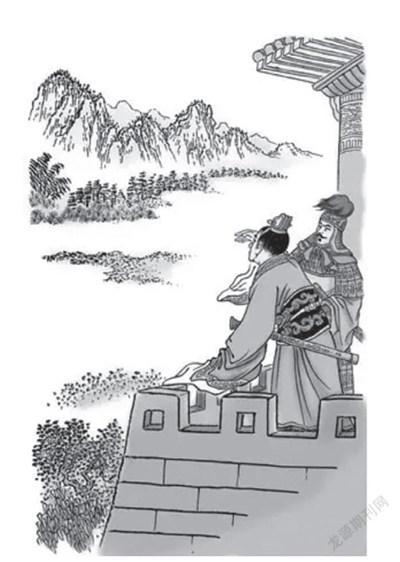Every Bush and Tree Looks Like an Enemy 草木皆兵
龙菲

“草木皆兵”出自《晋书·苻坚载记》,比喻军队退败时心虚,把草木看成士兵。与“草木皆兵”意思相近的词还有“风声鹤唳”“杯弓蛇影”等。
During the Eastern Jin Dynasty, Fu Jian, king of Former Qin, ruled northern China. In the year 383, knowing that the Eastern Jin's army was short of soldiers, Fu Jian wanted to seize the opportunity to stage a quick attack to the Eastern Jin. Xie Shi and Xie Xuan, senior generals of the Eastern Jin, led troops to "resist.
Unexpectedly, Fu Jian's army was beaten and suffered heavy losses in the first round of fighting. After that, Fu Jian looked down from thecity wall and was 2'terrified when he saw the well-trained army of the East- ern Jin. It was cloudy and windy. So it was hard for him to see clearly. When he looked around, he mistook the bushes and trees for enemies. As a result, when the nervous Fu Jian led his army into 3lbattle, he was defeated again. The Eastern Jin's army won a great victory with fewer soldiers.
1) resist [n'zist] v.對抗;应战
3) battle ['bætl] n.战斗 2) terrified['tenfaid] adj.害怕的;恐惧的
东晋时期,前秦的国主苻坚统治中国北方。公元383年,苻坚得知东晋士兵短缺,于是他想抓住这个机会,带领部队突袭东晋。东晋大将谢石、谢玄带领部队应战。
不料,苻坚在第一回合战败,伤亡惨重。第一回合战败之后,苻坚从城墙俯视远方,当他看到东晋训练有素的部队时,感到非常害怕。那天恰逢阴天,又有风,他很难看清楚远方事物。所以当他环视四周的时候,他错把草丛和树木当成了东晋士兵。结果就是,当紧张的苻坚带领自己的军队投入战斗,他再一次被东晋打败。东晋用自己人数有限的军队打败了人数众多的前秦军队,取得了胜利。
Answer the questions:
1. Why did Fu Jian mistake the bushes and trees for enemies?
2.How many times was Fu Jian' s army beaten in the fighting?
Background Knowledge
Fu Jian was a famous statesman and reformer in ancient China and the third king of the Former Qin. Fu Jian admired the Han culture, contributed to the continua- tion of the Han culture.
苻坚是中国古代著名政治家、改革家,前秦第三位君王。苻坚崇尚汉文化,对汉文化的延续有所贡献。
Know More
There is an element of psychological illusion in this story. People are paranoid in a state of extreme panic. They will have a distorted perception of external events. This distortion has a fixed tendency. It will happen in the proper conditions.This story is an illusion produced in the context of failure and panic.
“草木皆兵”这个典故含有心理学错觉的元素。人们在极度惊慌状态下易产生多疑心理,对外界事物产生歪曲的知觉。这种歪曲带有固定的倾向。只要具备条件,它必然会产生。“草木皆兵”就是在失败而慌张的情境下产生的错觉。

